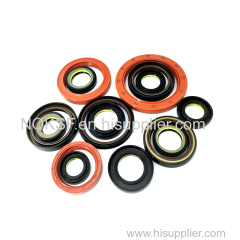
Factory Prices TC HTC TB TG SC TA Oil Seal NBR FKM ACM High Pressure Oil Seal
| Min. Order: | 500 Piece/Pieces |
|---|---|
| Trade Term: | EXW |
| Payment Terms: | L/C, D/P, D/A, T/T, WU |
| Supply Ability: | 10000000 |
| Place of Origin: | Hebei |
Company Profile
| Location: | Xingtai, Hebei, China (Mainland) |
|---|---|
| Business Type: | Manufacturer |
Product Detail
| Means of Transport: | Ocean, Air, Land |
|---|---|
| Standard or Nonstandard: | Standard |
| Style: | Others |
| Material: | Rubber |
| Brand Name: | nqksf |
| Application: | Industrial bearing, Pump Hydraulic Machine Rotary Shaft |
| Feature: | Oil/ Heat/ High Pressure Resistance, Durable |
| MOQ: | 10 PCS |
| Production Capacity: | 10000000 |
| Packing: | 10 pcs/ 1 paper scroll |
| Delivery Date: | 7-15 |
Product Description
Oil seals play a critical role in the functioning and longevity of mechanical equipment. These seals, typically made from rubber or elastomeric materials, are designed to keep lubricants contained and prevent dirt, dust, or moisture from entering machinery compartments. While they may seem like simple components, their importance cannot be overstated.
1. Preventing Lubricant Leakage
One of the primary functions of oil seals is to prevent the leakage of lubricants. In any mechanical system, lubricants are essential for reducing friction between moving parts, thereby minimizing wear and tear. A well-functioning oil seal ensures that these lubricants remain where they are needed, avoiding costly spills and maintaining optimal operating conditions. Without effective sealing, lubricants can escape, leading to insufficient lubrication, increased friction, overheating, and ultimately, mechanical failure.
2. Shielding Against Contaminants
Alongside retaining lubricants, oil seals serve as barriers against contaminants such as dirt, dust, and moisture. Contamination can severely damage components within machinery, leading to decreased efficiency and potential breakdowns. For instance, in automotive applications, dirt and moisture can infiltrate critical areas, causing corrosion and severe wear on bearings and other vital parts. A robust oil seal protects these components, ensuring a longer operational life and reliability of the machinery.
3. Enhancing Efficiency and Performance
Well-designed oil seals contribute to the overall efficiency and performance of mechanical equipment. They maintain the correct levels of lubrication and protect against contaminants, which can enhance the overall effectiveness of the machinery. By facilitating smoother operation, oil seals help reduce energy consumption, thereby contributing to cost savings for industrial operators. For instance, in processing plants, efficient seal performance can lead to significant reductions in operational costs and downtime, improving productivity.
4. Varieties of Oil Seals
Oil seals come in various types and materials, each suited for specific applications. Common types include lip seals, rotary seals, and radial seals, with materials ranging from rubber to more sophisticated thermoplastics. Each design serves different needs; for example, lip seals are ideal for applications involving rotating shafts, while static seals may be employed in non-moving joints. This variety ensures that mechanical engineers can choose the most suitable seal for their specific operational contexts, further enhancing the effectiveness and durability of their equipment.
Oil seals are not merely accessories in mechanical equipment; they are vital components that support operational efficiency, protect against contamination, and prevent lubricant loss. As technology evolves, so too do the designs and materials used in oil seals, making them more effective than ever. As engineers and manufacturers continue to prioritize the importance of these seals, understanding their critical role will ensure the reliability and longevity of machinery across various industries.

